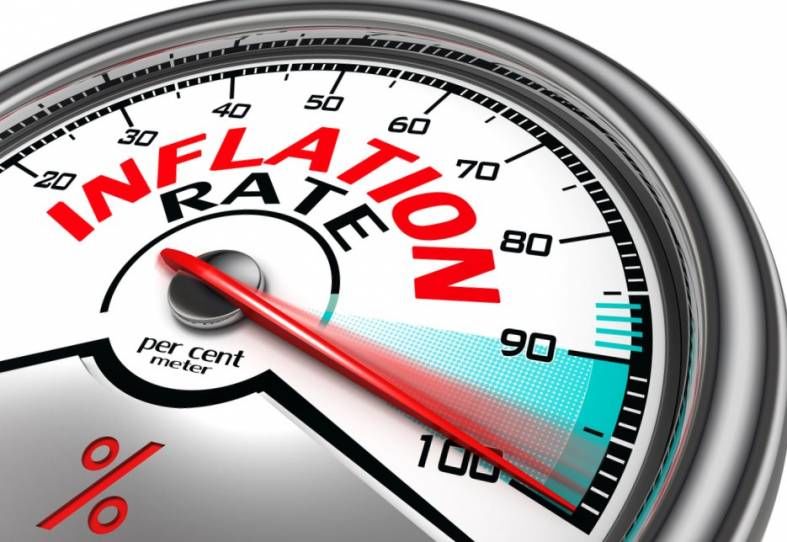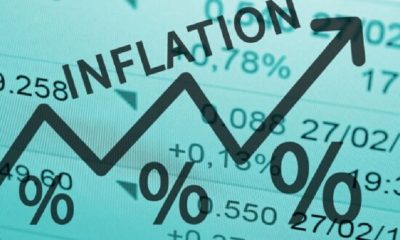Economy
Sticky Food Prices Limit Headline Inflation Moderation at 16.05%

By Cordros Research
Yesterday, the National Bureau of Statistics (NBS) released the Consumer Price Index (CPI) report for the month of July, showing that Nigeria’s inflation rate increased by 16.05 percent y/y, 5 bps lower than the 16.10 percent recorded in June, marking the sixth successive y/y decline in the headline index.
Broadly in line with our forecast, albeit 10 bps ahead of Bloomberg’s compiled average estimate of 15.95 percent, the inflation figure is consistent with the sense that the base effect driven moderation expected at the beginning of the year has waned.
Again, the fact that the headline index came above consensus, as has been the trend thus far this year, further corroborates the case that prices remain sticky downward. Good to mention, however, the month-on-month price increase of 1.21 percent, 37 bps lower than June’s 1.58 percent, is the second consecutive m/m moderation recorded thus far in 2017, and the lowest since January (1.01 percent).
On average, from end-2016 level, month-on-month inflation has increased by 1.50 percent, 22 bps higher than the 1.28 percent average recorded in the seven months to December 2016.
While it may be argued that the persisting inflationary pressure again supports the central bank’s Monetary Policy Committee’s (MPC) case of holding the line on its policy stance, we think the Committee’s subsequent decisions will largely be influenced by its considerations of inflation volatility and expectation, rather than inflation itself.
As shown in a recent study by the apex bank, “Modelling Inflation Rate Volatility in Nigeria with Structural Breaks”, inflation level in an economy may not really be what matters strictly but inflation volatility, and fiscal policies importantly affect the latter.
The study guides that inflation only causes high inflation volatility only in a situation where monetary policy is dominated by fiscal policy and the government deficit cannot be predicted. That partly confirms the MPC’s persistent call on the fiscal authority to pursue complementary policies that support fiscal-monetary policy harmony.
Downplaying the likelihood of a rate hike, despite identified likely risks to banking system liquidity amid anticipated fiscal injections over H2-2017, the MPC clearly noted that additional tightening will widen the income gap, weigh down aggregate consumption, and further constrain credit to the real sector of the economy.
Strengthening the case for a rate cut, on the other hand, a critical assessment of the Committee’s considerations in its last meeting reveals that, unlike in May – where members expressed uncertainty around key economic activities particularly food production – expectation is for a robust harvest season capable of subduing the rate of price increase on the food component, which is expected to combine with continued moderation in core inflation to ease the pressure on the headline index.
That said, we suspect a rate cut is unlikely to be earlier than November when output growth would have comfortably returned to the positive value, inflation rate would have decelerated close to the empirically established 10 percent – 12.5 percent threshold for Nigeria, and exchange rate stability would have been relatively consolidated.
Notably, consistent with observed trend this year, all classification of Individual Consumption by Purpose (COICOP) which aggregates the headline index increased during the month under review, with sizable price increases reported in the following major divisions: oil and fats, bread and cereals, meat, coffee, tea and cocoa, vegetables, fish, potatoes, yam and other tubers, and garments and clothing materials and other articles of clothing.
Food Index Pressure Persists
Food inflation increased by 20.28 percent y/y (vs. 19.91 percent in June), with the import component declining for the eighth consecutive month to hit a 17-month low of 14.08 percent.
Meanwhile, m/m rate in this segment, at 1.52 percent (vs. June’s 1.99 percent), continued the moderation it started in June, consistent with the 0.15 percent m/m drop in the average prices reportedly paid by households across various rural and urban markets and informal arrangements, according to the NBS Selected Food Price Watch for July, driven by notable declines in the prices of egg (-3.14 percent), bread (-1.90 percent), chicken (-1.30 percent), gari (-1.15 percent), and rice (-1.10 percent). Year-to-date, the food index has increased by 14.4 percent, compared to 11.6 percent same period last year.
Core Inflation Sustains Slower Rate of Increase
Core inflation increased at a slower pace for the eight consecutive month, rising by 12.20 percent in July, versus 12.50 percent in June, with the highest increases reported in clothing materials and articles of clothing, furniture and furnishing, books and stationary, medical services, glassware, tableware & household utensils, accommodation services and household textiles.
On a m/m basis, prices rose at a slower rate in this segment at 1.00 percent (1.32 percent the previous month), benefitting from reported decreases of 0.3 percent, 2.36 percent, and 6.08 percent in average national prices of premium motor spirit, kerosene, and diesel to N145.9/litre, N280.49/litre, and N197.62/litre respectively.
Food Prices Remain Fundamental to Headline Inflation
Clearly, the direction of headline inflation for the rest of the year will be largely driven by food prices. Save for potential risk of negative surprises, specifically with regards foreign exchange, and the possible increase in electricity tariff, we expect continued moderation in the core component.
Drilling down events vis-à-vis food prices, results being reported in most areas vis-à-vis the dry season harvest are generally favourable.
The raining season has commenced with near-normal timing and cumulative rainfall across most of the country, in line with earlier guidance for the rainy season through September/October for average to above-average cumulative precipitation.
In its latest report, FEWS NET revealed that outside of the northeast, staple harvests that begin as late as October in northern areas are likely to be more robust than last year’s, due to increased access to inputs as well as strong production incentives for farmers due to very high staple food prices, in addition to increased government funding and support. Granted, incidence of flooding has been reported in most parts of the country but not primarily on the back of unusually heavy downpour.
More so, affected areas were largely residential not farmlands.
That said, for the rest of 2017, we maintain our position that except monthly inflation rate stays below the 1.5 percent average recorded since the beginning of the year, the likelihood of the headline index reaching 20 percent by December cannot be ruled out.
To be specific, we forecast the headline inflation rate in 2017 to average 16.10% (bull case) or 17.73 percent (bear case).
Meanwhile, we look for the CPI recording a marginal decline to 16.03 percent y/y and 1.00 percent m/m in August.
Economy
NGX Market Cap Surpasses N110trn as FY 2025 Earnings Impress Investors

By Dipo Olowookere
Investors at the Nigerian Exchange (NGX) Limited have continued to show excitement for the full-year earnings of companies on the exchange so far.
On Friday, Customs Street further appreciated by 1.01 per cent as more organization released their financial statements for the 2025 fiscal year.
During the session, traders continued their selective trading strategy, with the energy sector going up by 2.47 per cent at the close of business despite profit-taking in the banking counter, which saw its index down by 0.11 per cent.
Yesterday, the insurance space grew by 2.16 per cent, the industrial goods segment expanded by 1.70 per cent, and the consumer goods industry jumped by 0.42 per cent.
Consequently, the All-Share Index (ASI) increased by 1,722.13 points to 171,727.49 points from 170,005.36 points, and the market capitalisation soared by N1.106 trillion to N110.235 trillion from the N109.129 trillion it ended on Thursday.
Business Post reports that there were 59 appreciating stocks and 19 depreciating stocks on Friday, representing a positive market breadth index and strong investor sentiment.
The trio of Omatek, Deap Capital, and NAHCO gained 10.00 per cent each to sell for N2.64, N6.82, and N136.40 apiece, as Zichis and Austin Laz appreciated by 9.98 per cent each to close at N6.72 and N5.40, respectively.
Conversely, The Initiates depreciated by 9.74 per cent to N19.45, DAAR Communications slumped by 7.32 per cent to N1.90, United Capital crashed by 6.55 per cent to N18.55, Coronation Insurance lost 5.71 per cent to quote at N3.30, and First Holdco shrank by 5.53 per cent to N47.00.
The activity chart showed an improvement in the activity level, with the trading volume, value, and number of deals up by 33.77 per cent, 93.27 per cent, and 10.63 per cent, respectively.
This was because traders transacted 953.8 million shares worth N43.1 billion in 51,005 deals compared with the 713.0 million shares valued at N22.3 billion traded in 46,104 deals a day earlier.
Fidelity Bank was the most active with 92.4 million units sold for N1.8 billion, Chams transacted 69.2 million units valued at N310.9 million, Deap Capital exchanged 59.1 million units worth N382.7 million, Access Holdings traded 57.2 million units valued at N1.3 billion, and Tantalizers transacted 48.6 million units worth N228.2 million.
Economy
Naira Retreats to N1,366.19/$1 After 13 Kobo Loss at Official Market

By Adedapo Adesanya
The value of the Naira contracted against the United States Dollar on Friday by 13 Kobo or 0.01 per cent to N1,366.19/$1 in the Nigerian Autonomous Foreign Exchange Market (NAFEX) from the previous day’s value of N1,366.06/$1.
According to data from the Central Bank of Nigeria (CBN), the Nigerian currency also depreciated against the Pound Sterling in the same market window yesterday by N2.37 to N1,857.75/£1 from the N1,855.38/£1 it was traded on Thursday, and further depleted against the Euro by 57 Kobo to close at N1,612.52/€1 versus the preceding session’s N1,611.95/€1.
In the same vein, the exchange rate for international transactions on the GTBank Naira card showed that the Naira lost N8 on the greenback yesterday to N1,383/$1 from the previous day’s N1,375/$1 and at the black market, the Nigerian currency maintained stability against the Dollar at N1,450/$1.
FX analysts anticipate this trend to persist, primarily influenced by increasing external reserves, renewed inflows of foreign portfolio investments, and a reduction in speculative demand.
In the short term, stability in the FX market is expected to continue, supported by policy interventions and improving market confidence.
Nigeria’s foreign reserves experienced an upward trajectory, increasing by $632.38 million within the week to $46.91 billion from $46.27 billion in the previous week.
The Dollar appreciation this week appears to be largely technical, serving as a correction to the substantial losses experienced from mid- to late January.
Meanwhile, the cryptocurrency market slightly appreciated, with Bitcoin (BTC) climbing near $68,000, up nearly 5 per cent since hitting $60,000 late on Thursday after investor confidence in crypto’s utility as a store of value, inflation hedge, and digital currency faltered.
The sell-off extended beyond crypto, with silver plunging 15 per cent and gold sliding more than 2 per cent. US stocks also fell.
The latest recoup saw the price of BTC up by 4.7 per cent to $67,978.96, as Ethereum (ETH) appreciated by 6.3 per cent to $2,021.10, and Ripple (XRP) surged by 9.5 per cent to $1.42.
In addition, Solana (SOL) grew by 7.3 per cent to $85.22, Cardano (ADA) added 6.1 per cent to trade at $0.2683, Dogecoin (DOGE) expanded by 5.4 per cent to $0.0958, Litecoin (LTC) rose by 5.2 per cent to $53.50, and Binance Coin (BNB) jumped by 2.3 per cent to $637.79, while the US Dollar Tether (USDT) and the US Dollar Coin (USDC) traded flat at $1.00 each.
Economy
Oil Prices Climb on Worries of Possible Iran-US Conflict

By Adedapo Adesanya
Oil prices settled higher on Friday as traders worried that this week’s talks between the US and Iran had failed to reduce the risk of a military conflict between the two countries.
Brent crude futures traded at $68.05 a barrel after going up by 50 cents or 0.74 per cent, and the US West Texas Intermediate (WTI) crude futures finished at $63.55 a barrel due to the addition of 26 cents or 0.41 per cent.
Iran and the US held negotiations in Muscat, the capital of Oman, on Friday to overcome sharp differences over Iran’s nuclear programme.
It was reported that the talks had ended with Iran’s foreign minister saying negotiators will return to their capitals for consultations and the talks will continue.
Regardless, the meeting kept investors anxious about geopolitical risk, as Iran wanted to stick to nuclear issues while the US wanted to discuss Iran’s ballistic missiles and support for armed groups in the region.
Any escalation of tension between the two nations could disrupt oil flows, since about a fifth of the world’s total consumption passes through the Strait of Hormuz between Oman and Iran.
Saudi Arabia, the United Arab Emirates, Kuwait and Iraq export most of their crude via the strait, as does Iran, which is a member of the Organisation of the Petroleum Exporting Countries (OPEC).
According to Reuters, Iran objected to the presence of any US Central Command (CENTCOM) or other regional military officials, saying that would jeopardise the process.
The current confrontation was sparked by more than two weeks of unrest in Iran that saw authorities launch a deadly crackdown that killed thousands of civilians and shocked the world. As reports of the deaths trickled out of Iran, US President Donald Trump threatened to strike Iran if any of the tens of thousands of protesters arrested were executed.
Meanwhile, Kazakhstan’s planned oil exports could fall by as much as 35 per cent this month via its main route through Russia, as the country’s top oil company, Tengiz oilfield, slowly recovers from fires at power facilities in January.
ING analysts have pointed out Iran’s neighbour, Iraq, and a disagreement with the US as another bullish factor for oil prices. It seems Iraqi politicians favour Mr Nouri al-Maliki as the country’s next Prime Minister, but the US thinks Mr al-Maliki is too close to Iran. President Trump has already threatened the oil producer with consequences if he emerges as PM.
-

 Feature/OPED6 years ago
Feature/OPED6 years agoDavos was Different this year
-
Travel/Tourism9 years ago
Lagos Seals Western Lodge Hotel In Ikorodu
-

 Showbiz3 years ago
Showbiz3 years agoEstranged Lover Releases Videos of Empress Njamah Bathing
-

 Banking8 years ago
Banking8 years agoSort Codes of GTBank Branches in Nigeria
-

 Economy3 years ago
Economy3 years agoSubsidy Removal: CNG at N130 Per Litre Cheaper Than Petrol—IPMAN
-

 Banking3 years ago
Banking3 years agoSort Codes of UBA Branches in Nigeria
-

 Banking3 years ago
Banking3 years agoFirst Bank Announces Planned Downtime
-

 Sports3 years ago
Sports3 years agoHighest Paid Nigerian Footballer – How Much Do Nigerian Footballers Earn



















